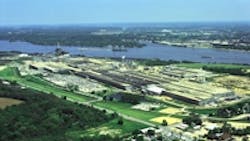When President Obama wanted to make the case for advanced manufacturing as a catalyst for the economy, he made a point to visit Riverdale, Iowa.
Nestled on the banks of the Mississippi River, the city is home to Alcoa Inc.'s Davenport Works aluminum plant, which Alcoa trumpets as "one of the most advanced manufacturing plants in the world."
The company also considers Davenport Works an "American manufacturing success story," as Alcoa Chairman and CEO Klaus Kleinfeld asserted prior to Obama's visit in late June.
"We were able to show [Obama] a facility that has come back pretty strongly from the economic downturn," says John Riches, public affairs manager for the Alcoa plant.
In doing so, Davenport Works has grown its employment ranks to more than 2,200 people, Riches notes, after the plant had to trim its workforce down to 1,700 people during the recession.
"Part of what I think [Obama] wanted to see when he was here was a facility that has not only come back from the downturn but has done a lot of product innovation over the years to make sure that we continue to make our product here in the U.S. and in a competitive way that allows us to export around the world," Riches says. Approximately 25% of the plant's annual revenues come from exports.
Alcoa is just one of many manufacturing success stories unfolding in Iowa.
Some 4,100 manufacturers employ 206,000 people throughout the state, making manufacturing Iowa's largest industry. In 2010, Iowa's manufacturing GDP was 17.8% of the state total.
This past October, high-tech plastics manufacturer Accu-Mold LLC broke ground on a $7 million expansion of its facility in Ankeny, Iowa. The company is adding 43 employees and 40,000 square feet of space to boost its production of micro-size injection-molded plastic parts and components.
In April, Valent BioSciences Corp. said it will shift its manufacturing operations from North Chicago, Ill., to Osage, Iowa, where it will build a new fermentation factory on a 73-acre campus. Valent says the $150 million project is the largest single investment of any company in the world to support the manufacturing of biorational products.
"Right now we're seeing some really good numbers in manufacturing," says Debi Durham, director of the Iowa Department of Economic Development, "not only in expansions that are occurring in growth and employment but also in some big capital-investment projects that are coming down the pipeline."
'Focusing on Manufacturing'
Iowa has leveraged its abundant agricultural resources to build a burgeoning food manufacturing and processing sector, which contributes nearly $6 billion to the state's GDP. But its agricultural assets also have been the springboard for the production of ethanol and other biomass-based fuels and chemicals.
The state also is seeing clusters emerge in the wind-power industry -- Iowa claims it is one of only two states that manufacture all of the main components of a wind turbine -- and even aerospace. Cedar Rapids-based Rockwell Collins expects to play an important role in helping Boeing build the next Air Force aerial refueling tanker, which should bring several hundred more jobs to Cedar Rapids.
"We really are focusing on manufacturing," Durham says. "And quite frankly I believe manufacturing will become more of the narrative going forward."
The state has created a "pro-manufacturing tax climate" that should keep the story going, she adds.
Manufacturers in Iowa do not pay property taxes or sales/use taxes on their machinery, equipment and computers, nor do they pay sales taxes on materials or electricity or natural gas used in manufacturing.
Iowa also boasts 50% deductibility of federal taxes from state corporate income, and a refundable R&D tax credit up to 6.5% of qualifying expenditures in the state, among other business-friendly tax policies.
For three years running, CNBC's America's Top States for Business has ranked Iowa as the cheapest state in the country to do business.
"So we believe we're sitting in a very good place right now," Durham says.
About the Author
Josh Cable
Former Senior Editor
Former Senior Editor Josh Cable covered innovation issues -- including trends and best practices in R&D, process improvement and product development. He also reported on the best practices of the most successful companies and executives in the world of transportation manufacturing, which encompasses the aerospace, automotive, rail and shipbuilding sectors.
Josh also led the IndustryWeek Manufacturing Hall of Fame, IW’s annual tribute to the most influential executives and thought leaders in U.S. manufacturing history.
Before joining IndustryWeek, Josh was the editor-in-chief of Penton Media’s Government Product News and Government Procurement. He also was an award-winning beat reporter for several small newspapers in Northeast Ohio.
Josh received his BFA in creative writing from Bowling Green University, and continued his professional development through course-work at Ohio University and Cuyahoga Community College.
A lifelong resident of the Buckeye State, Josh currently lives in the Tremont neighborhood of Cleveland. When the weather cooperates, you’ll find him riding his bike to work, exercising his green thumb in the backyard or playing ultimate Frisbee.
